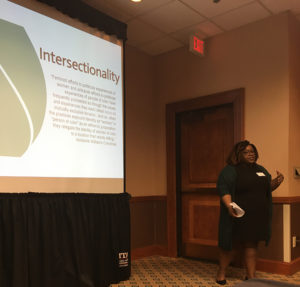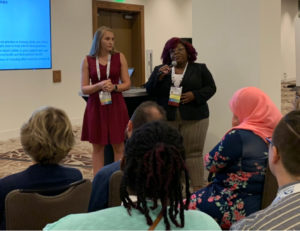Chélynn Randolph recently was named a McKnight Dissertation Fellow. She joins a prestigious group of scholars around the state of Florida across a number of disciplines.

Winning the award surprised Chélynn. “It honestly felt surreal!” she says. “I know a few people who have been McKnight Doctoral Fellows and the competitiveness of the award was always something I had heard about, so I felt honored and excited to be a fellow for such an amazing organization.” The McKnight Doctoral and Dissertation fellowships support under-represented populations, particularly African Americans and Hispanic. The program aims to increase the number of individuals who have earned doctoral degrees, increasing representation in both academia and the workforce.
As part of her fellowship, Randolph will receive a stipend to help her complete her dissertation and focus on her important research; however, the financial support is just one aspect that will help her with her professional career. “Being a McKnight Dissertation Fellow gives me access to mentorship regarding grant writing, completing a dissertation, publishing research, being on the academic job market, and a lot of other things that are beneficial to me as a doctoral candidate in my last year.”
Chélynn current research is on how Black Americans overcome the stigma to seek therapy. So far, she’s discovered that “for Black emerging adults, being exposed to the concept of therapy at a young age makes it easier for them to overcome the stigma of seeking help for their mental health later in adulthood. Another insight I’ve gained is that support from friends who were already engaged in therapy was something that helped Black Americans overcome stigma as well.”
On top of her studies and teaching, she also has contributed to the ongoing conversation locally and nationally on the stigma around therapy, particularly in the Black community. For instance, she recently appeared in an article on WTXL where she talks about racism in the workplace, difficulties in finding a therapist, and more.
For Chélynn, the decision to come to Florida State University wasn’t just for the opportunity to study her research interests. “I decided to come to FSU because after going through the interview process I left feeling like it was the kind of supportive environment I needed to get through such a difficult program,” she says. “Our program is also known for producing some of the top researchers in the field of marriage and family therapy and I knew I would learn all I needed to learn about being a great researcher here so it was an easy choice for me to ultimately choose FSU.”

After finishing the program, she hopes to become a faculty member in a clinically focused program “where I can use my research while training up and coming therapist on how to best engage with Black American and other racially marginalized clients who encounter barriers to mental health services.”
